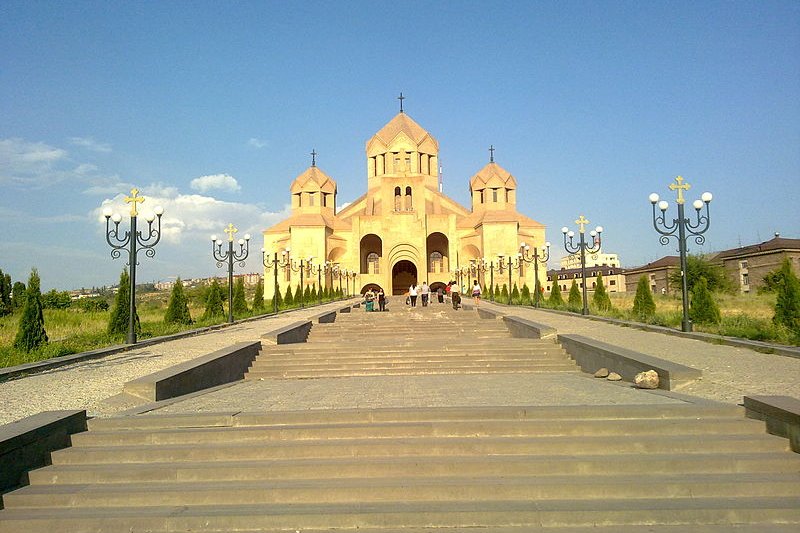 Cathedral of St Gregory the Illuminator, one of the most important churches in Yerevan, Armenia
Cathedral of St Gregory the Illuminator, one of the most important churches in Yerevan, ArmeniaSource: https://commons.wikimedia.org/wiki/File:Saint_Gregory_the_Illuminator_Cathedral,_Yerevan-3.jpg
Author: Pandukht

Author: Pandukht

Yerevan (Armenian: Երևան) is the capital and biggest city in Armenia. Established in the 8th century BC, it is also one of the oldest continuously inhabited cities in the world. Yerevan covers 227 sq km (87.6 sq mi) and has a population of 1.1 million people. Its time zone is UTC+4 and in summer UTC+5.
Yerevan is located on the banks of the Hrazdan River, at an average elevation of 989 m (3,246 ft), on the northeastern part of the Ararat plain. The city sprawls on a slope with the mountains bordering it on three sides to the north while the Hrazdan river flows in the south.
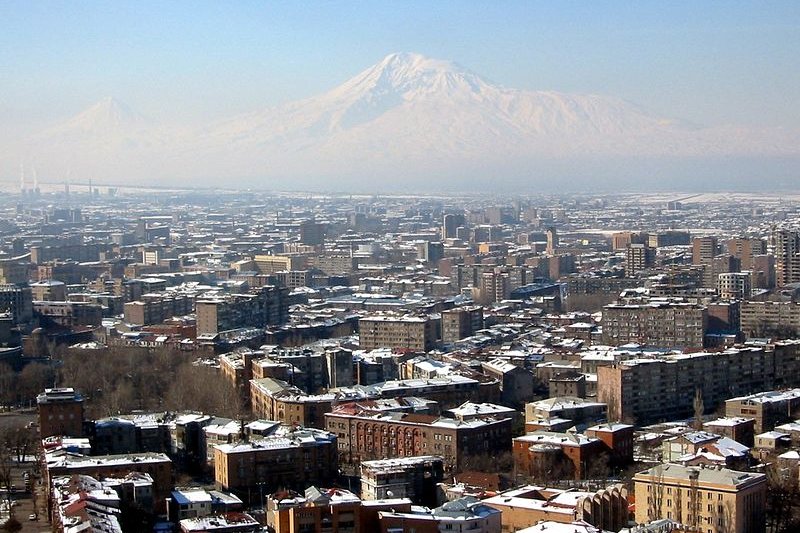 Mount Ararat looming in the horizon with , Armenia, in the foreground
Mount Ararat looming in the horizon with , Armenia, in the foregroundSource: https://commons.wikimedia.org/wiki/File:Yerewan_with_Ararat.jpg
Author: Mcschreck

Author: Mcschreck

Yerevan experiences a semi-arid continental climate. Summers here are very hot and dry while the winters are cold with heavy snow. The hottest month is July, when the average high temperature may rise to 34°C (93.2°F). On the other hand, the average low temperature in January, the coldest month, is a frigid -7.8°C (18°F). Yerevan is arid with total precipitation of just 277 mm (10.91 in). The wettest month is May, which receives 44 mm (1.73 in) of rain.
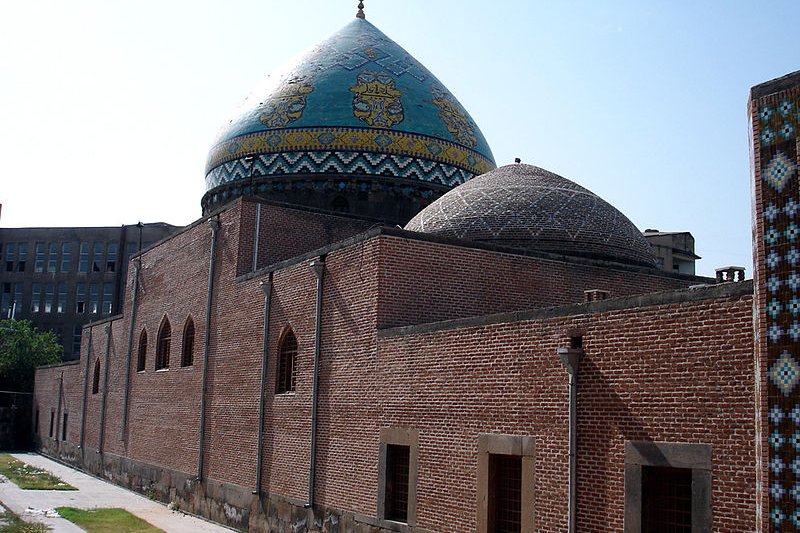 The Blue Mosque of Yerevan, so named due to its beautiful blue dome
The Blue Mosque of Yerevan, so named due to its beautiful blue domeSource: https://commons.wikimedia.org/wiki/File:Erevan_-_La_Mosqu%C3%A9e_bleue_03.JPG
Author: Antonov14

Author: Antonov14

The site of modern Yerevan was the site of the Kingdom of Van in the 9th century BC. The city was conquered by the Arabs in 658 AD. In the course of history, control over it changed hands multiple times between the Arabs, Persians and Turks (Ottomans). By the 16th century, most of its inhabitants were Muslims.
Yerevan was captured by Russian troops during the second Russian-Persian War of 1827. It was during this peiord that an Armenian dispora was created, as Tsarist Russia sponsored Armenian resettlement from Persians and Turkey, increasing the percentage of ethnic Armenians from 28% to 54%.
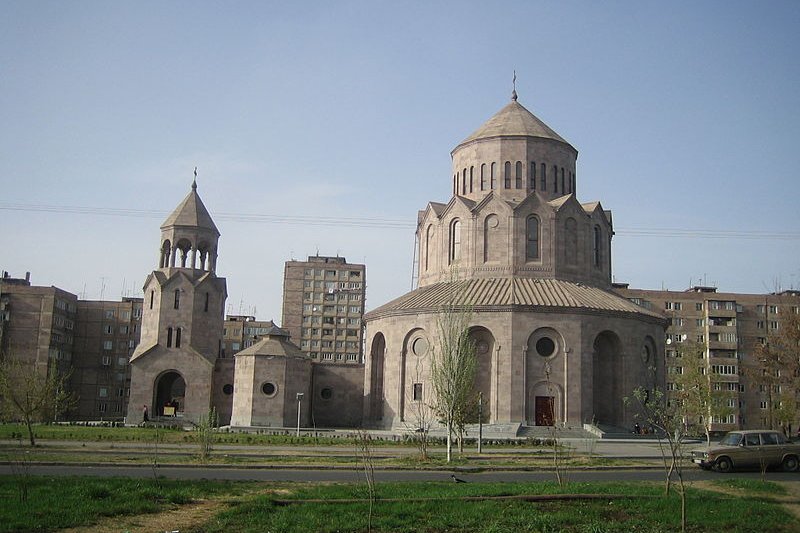 Holy Trinity Church, Yerevan
Holy Trinity Church, YerevanSource: https://commons.wikimedia.org/wiki/File:Holy_Trinity_Church,_Malatia-Sebastia,_Yerevan,_Armenia.jpg
Author: Serouj

Author: Serouj

After the Russian Empire was dissolved in the October Revolution, Yerevan briefly became the capital of an independent Democratic Republic of Armenia, established in 1918. However in 1920 the Bolshevik 11th Red Army entered Yerevan and made Armenia part of the Soviet Union.
Armenia was only independent once again when the Soviet Union was dissolved, and Yerevan became the capital of the new Republic of Armenia on 21 September, 1991.
Visiting Yerevan
Zvartnots International Airport (EVN) in Yerevan is the gateway to Armenia, receiving flights from major cities in Central Asia, Europe and the Middle East. The airport is 14 km from downtown Yerevan and can be reached by taxi. The fare is AMD 3000 for the city center.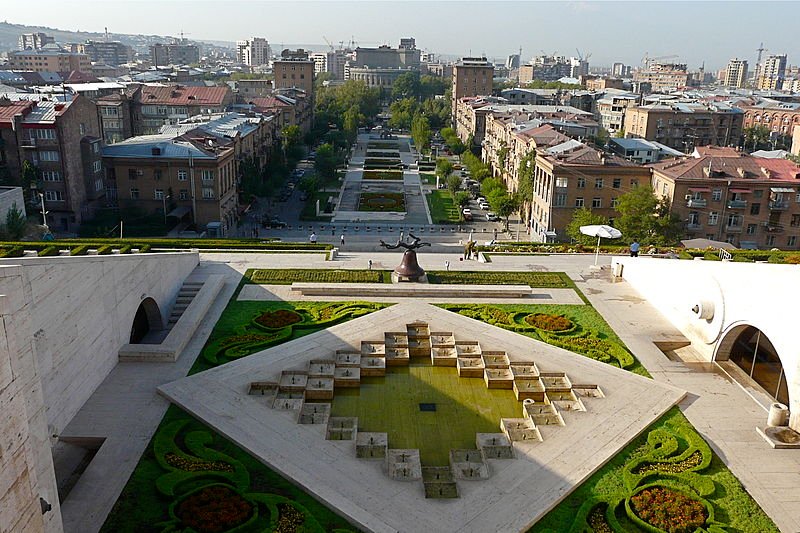 View from the Cascade, a meticulously laid park in downtown Yerevan
View from the Cascade, a meticulously laid park in downtown YerevanSource: https://commons.wikimedia.org/wiki/File:Viw_from_cascade2008.jpg
Author: Rita Willaert

Author: Rita Willaert

Places of Interest in Yerevan
- Abovian Street
Street lined with historic buildings from the early 20th century, particularly of the Art Nouveau and early Modern styles. - Armenian Genocide Memorial
Monument commemorating the Armenian Genocide. - Blue Mosque
18th century Shia mosque, one of the few places of worship that survived Soviet secularization. - Cathedral of St Gregory the Illuminator
This is a modern cathedral completed only in 2001, to commemorate 1700 years of Christianity in Armenia. It houses the holy relics of St Gregory, which was returned by the Vatican that year. - City Msueum of Yerevan
Museum tracing the history of Yerevan from paleolithic times until present day. - Erebuni Fortress
3000-year-old fortress built on the settlement that became Yerevan. - Museum of Woodwork
Museum showcasing the exquisite craftsmanship of Armenian wood carvings, with examples of furniture, door and other samples. - Northern Avenue
An emerging pedestrian zone and shopping precinct in Yerevan. - Republic Square
Soviet-style public square surrounded by government buildings. - Sculpture Park
Landscaped park with water cascades in Yerevan graced by sculptors from Botero and other famous sculptors.
 Latest updates on Penang Travel Tips
Latest updates on Penang Travel Tips
 Map of Roads in Penang
Map of Roads in Penang
Looking for information on Penang? Use this Map of Roads in Penang to zoom in on information about Penang, brought to you road by road.
Copyright © 2003-2025 Timothy Tye. All Rights Reserved.

 Go Back
Go Back